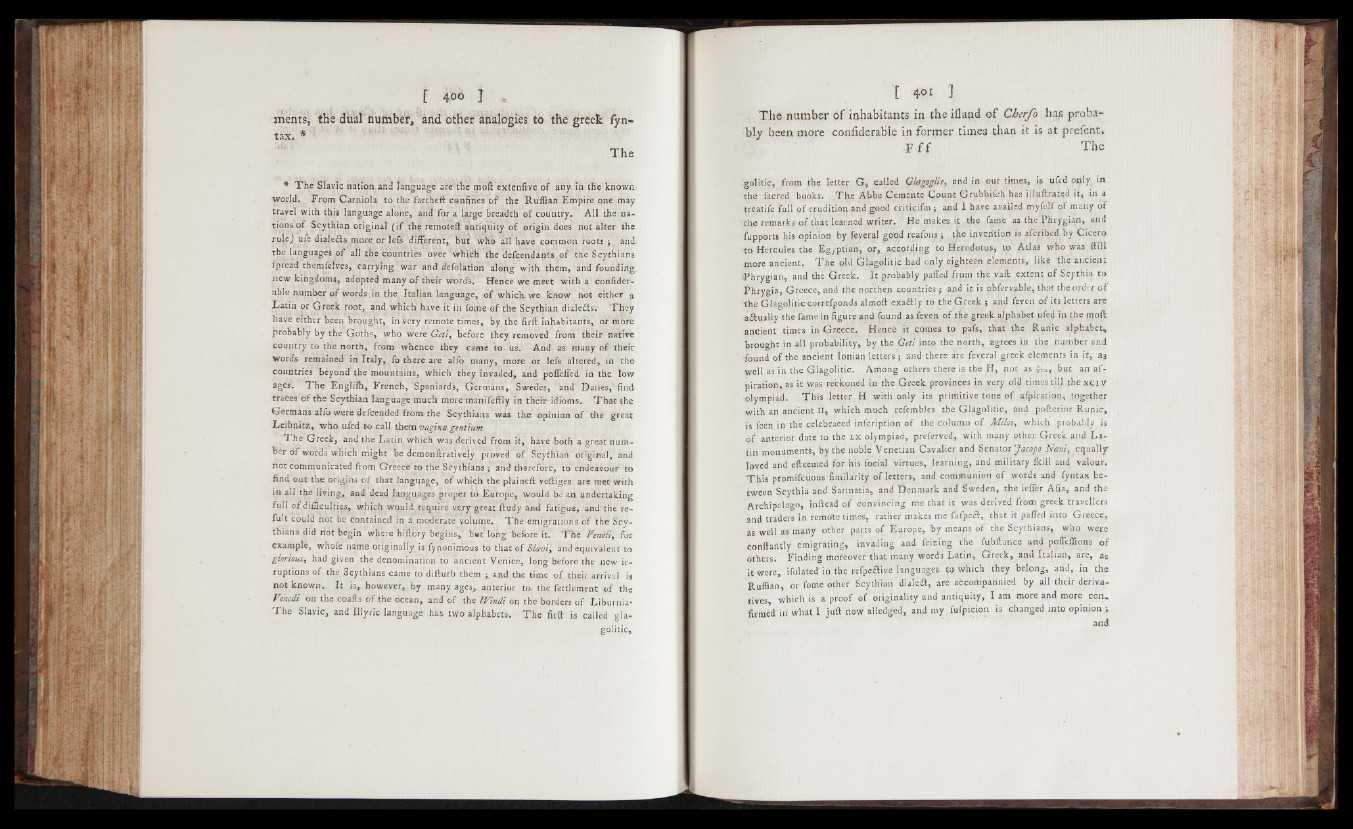
È 4°o J »
ments, the dual number, and other analogies to the greek fyn -
tax. *
T h e
* Th e Slavic nation and language are the moll extenfive of any in the known
world. From Carniola to the fartheft confines o f the Ruffian Empire one may
travel with this language alone, and for a large breadth of country.. A ll the nations
of Scythian origina? ( if thé remoteft antiquity of origin does not alter the
rolej ufe dialeéis more or lefs different, but who all have common roots ; and-
the languages o f all the countries over which the defcendants of the Scythians
ipread themfelves, carrying war and defblation along with them, and founding,
new kingdoms, adopted many o f their words. Hence we meet with a confider-
able number of words in the Italian language, o f whiclrwe know not either a
Latin or Greek root, and which have it in iome of the Scythian dialeéis. They
have either been brought, in very remote times, by the firil inhabitants, or more
probably by the Goths, who were Gaü, before they, removed from their native
country to the north, from whence they came to us. And as many of their
words remained in Italy, fo there are alfo- many, more or lefs altered,, in tho
countries beyond the mountains, which they invaded, and poffeffed in the low
ages. T h e Engliih, French, Spaniards, Germans, Swedes, and Danes, find
traces o f the Scythian language much more manifeffly in their idioms. Tha t the
Germans alfo were defcended from the Scythians was the opinion of the great
Leibnitz, who ufed to call them vagina gentium
T h e Greek, and the Latin which was derived from it, have both a great number
of words which might be demonftratively proved of Scythian original, and
not communicated from G !reece to the Scythians ; and* therefore, to endeavour to
find out the origins of that language, of which the plaineft vefb'géa are met with
in all the living, and dead languages proper to. Europe, would be an undertaking
full o f difficulties, which would require very-great fludy and fatigue, and the reluit
could not be contained in a. mcnderate volume. The emigrations of the Scythians
did not begin where hiffory begins,’ but long before it. Th e Feneh, for
example, whofe name originally is fynonimous to that of Slavic and equivalent to
glorious, had given the denomination to ancient Venice, long before the new irruptions
of the Scythians came to dillurb them ; and the time o f their arrival is
not known. It is, however, by many ages, anterior to- th.e fettleraen-t ©f the
Venedi on the coafis of the ocean, and of the JVindi on the borders of Liburnia*
T h e Slavic, and IIJyric language has two alphabets. Th e firil is called glagolitic,
T he number o f inhabitants in the ifland o f Cherfo has probably
been more confiderable in former times than it is at prefent.
F f f The
golitic, from the letter G , called Glagoglie, and in our times, is ufed only in
the facred books. Th e Abbe Cemente Count Grubbifch has illuftrated it, in a
treatife full of erudition and good criticifm j and I have availed myfelf of many of
'the remarks1 of that learned writer. He makes it the fame as the Phrygian, and
fupports his opinion by feveral good reafons; the invention is afcribed by Cicero
to Hercules the Egyptian, or, according to Herodotus, to Atlas who was ftill
more ancient. Th e old Glagolitichad only eighteen elements, like the ancient
^Phrygian, and the Greek. It probably palled-from the vaft extent of Scythia to
Phrygia, Greece, and the northen countries ; and it is obfervable, that the order o f
the G 1 ago!iticcorrefponds almoft exa&Iy to the Greek ; and feven of its letters are
adlually the fame in figure and found as feveh of the greek alphabet ufed in the moil
ancient times in Greece. Hence it comes to pafs, that the Runic alphabet,
brought in all probability, by the Geti into the north, agrees in the number and
found of the ancient Ionian letters ; and there are feveral greek elements in it, as
well as in the Glagolitic. Among others there is the H, not as «r«, but an af-
piration, as it was reckoned in the Greek provinces in very old times till the x c iv
•olympiad. Th is letter H with only its primitive tone of afpiration, together
with an ancient n, which much refembles the Glagolitic, and pofterior Runic,
is feen in the celebraeed infcription of the column o f Milos, which probably is
o f anterior date to the l x olympiad, preferved, with many other Greek and L a tin
monuments, by the noble Venetian Cavalier and Senator Jacopo Nani, equally
loved and efieemed for his focial virtues, learning, and military ikill and valour.
Th is ptomifcuous fimilarity of letters, and communion of words and fyntax between
Scythia and Sarmatia, and Denmark and Sweden, the leffer Afia, and the
Archipelago, inftead of convincing me that it was derived from greek travellers
and tradeYs in remote times,- rather makes me fufpe&, that it palled into Greece,
as well as many other parts of Europe, by means of the Scythians, who were
conftantly emigrating, invading and feifcing the fu.bftancc and pofleffions o f
others. Finding riioYeover that many words Latin, Greek, and Italian, are, as
it were, ifolated' in the refpe&ive languages to which they belong, arid, in tbe
Ruffian, or fome other Scythian dialed, are accoiripannied by all their derivatives
which is a proof of originality and antiquity, I am more and more con«
firme’d iri what I juft now alledged, and my fufpicion is changed into opinion ;